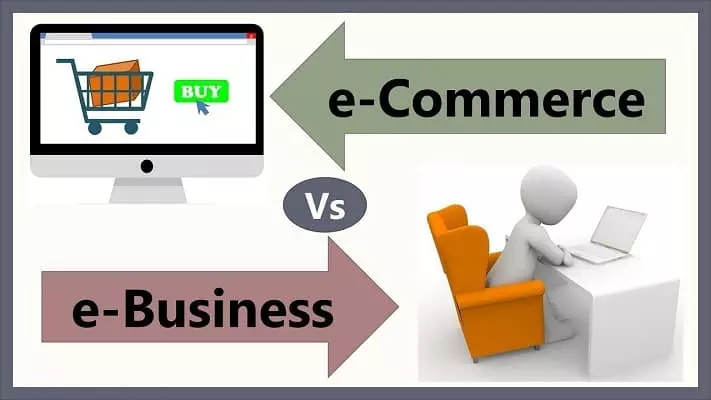Many people believe that e-commerce and e-business are the same things. They even use these terms interchangeably, but this is not true. There is a lot of difference between the two terms. In short, it can be said that e-commerce is only restricted to buying and selling products for a customer. In contrast, e-business includes all the internal and external procedures required to keep the business running. In an e-business, apart from buying & selling products online, it is also mandatory to manage your supply chain online. Some entities use a single customized software to manage their e-business, while others may use a host of software to get the job done. This may include CRM, ERP, and other type of software. You would have got a basic idea about what is the difference between e-business and e-commerce. Let us go ahead and check out more information about the two terms.
What is E-Commerce?
In e-commerce, you perform trading activities online. This includes the act of buying or selling a product. Money is involved in the purchase, and the payment can be received online or offline. Both parties must have an internet and mobile/web application to be involved in e-commerce. In a typical e-commerce ecosystem, there are going to be multiple vendors onboarding to a centralized platform. However, you will also come across a single vendor e-commerce ecosystem. The customer will place an order for the products needed online, which will be delivered to him via the retailer using the e-commerce platform. A perfect example of an e-commerce website or application includes Amazon & Flipkart. These platforms have onboarded multiple retailers, and they also have customers buying from them. Now E-commerce is one of the fastest growing industries in the world.
Activities Under E-Commerce
Different activities are included as a part of e-commerce. We have made a list of these activities in this section.
- Buying & selling a product online through a portal or an application.
- Online ticketing of the event or anything else
- Online payments
- Payment of taxes
- Account software online
- Online customer support.
Also Read: Nykaa Business Model: How Does Nykaa Make Money
E-Commerce Pros and Cons
|
Pros |
Cons |
| 1. Convenient for both consumers and sellers | 1. Risk of fraud and security breaches |
| 2. Access to a wider range of products | 2. Dependency on technology and internet access |
| 3. Lower overhead costs for sellers | 3. Lack of personal interaction |
| 4. Ability to reach a global market | 4. Difficulty in assessing product quality |
| 5. 24/7 availability | 5. Shipping and delivery delays |
| 6. Efficient and quick transactions | 6. Returns and refunds can be complicated |
| 7. Ability to easily compare prices | 7. Environmental impact of packaging and shipping |
What is E-Business?
As mentioned earlier, many people confuse e-commerce with e-business. However, this is not how it should be. E-business is very different from e-commerce. The meaning of e-business is to perform all types of business activities using the internet. A typical business needs procurement of raw materials or goods, offering customer support, managing employees, managing accounts, and selling products online to customers. All these activities should be done online to call it an e-business. Besides, an e-business may use applications, ERPs or CRMs to manage their work. E-business has a larger scope when compared with e-commerce. Apart from this, every e-business is e-commerce, but every e-commerce is not an e-business.
Talking about the example of e-business, if you look at Amazon from the equity owner’s perspective, Amazon is considered an e-business. However, when you look at Amazon from the perspective of a retailer or a seller, Amazon is an e-commerce activity for them. Another example of e-business is the auction sites that allow customers to buy products in the auction or where they can auction their products.
Activities Under E-Business
Let us now go through the activities usually done as a part of e-business.
- Customer Support
- Management of Business Transactions
- Management of the Supply Chain
- Online Marketing
- Online Store Setup
- Sale & Purchase of Products
E-Business Pros and Cons
|
Pros |
Cons |
| Increased global reach | Dependence on technology |
| Lower overhead costs | Security concerns |
| 24/7 accessibility | Difficulty building customer trust |
| Greater convenience for customers | Increased competition |
| Ability to personalize customer experiences | Difficulty with customer service and support |
| Increased data collection and analysis capabilities | Difficulty establishing brand recognition |
| Ability to scale quickly and easily | Potential for legal and regulatory challenges |
| Reduced environmental impact through digital transactions | Need for ongoing updates and maintenance of technology |
Difference Between E-Commerce & E-Business in Tabular Form
Below is a table that summarizes all the differences between e-commerce and e-business. Check it out now.
| E-Commerce | E-Business |
| E-Commerce is performing sales and purchases online. | E-business is managing all business activities online. |
| E-commerce is considered to be a subset of e-business. | E-business is part of the bigger picture and is known to be a superset of e-commerce. |
| Only commercial transactions are carried out in E-commerce. | In E-business, all types of business transactions are carried out online. |
| The transactions are limited in E-commerce. | There is always a huge number of transactions in E-business. |
| Restricted to buying & selling products to make money. | It has a broader scope and includes procurement, customer support, and managing accounts and employees. |
| E-commerce needs the use of a website or an application. | E-business needs specialized software along with CRMs, ERPs and other types of apps. |
| E-commerce needs the use of the internet by all parties. | E-business needs an intranet and internet for all the parties involved. |
| E-commerce is an appropriate choice in a B2C environment. | E-business is a better choice for a B2b environment. |
| E-commerce only covers external procedures. | E-business covers internal and external procedures. |
Final Verdict
This was all the information about e-commerce and e-business. We hope the pointers we have shared on this page will help you differentiate between the two. The two terms are related yet very different. After going through the differences between e-commerce and e-business, you will also be able to differentiate between the two types of entities. Both of them are interesting concepts. Lastly, every e-business is e-commerce but not every e-commerce is an e-business.
Also Read:
- E-Business Advantages and Disadvantages
- Difference Between E-Business and Traditional Business
- Business-to-business (B2B) Advantages and Disadvantages















